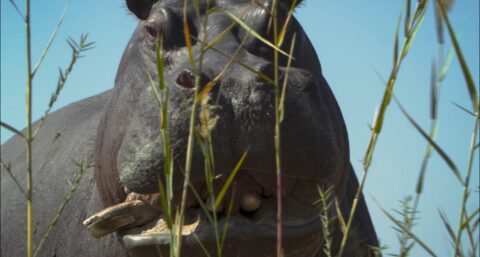Hippos seem to have endless cinematic potential. They feel prehistoric, mythical, like something out of a Japanese animation. With their short legs, big beer bellies and massive heads, with a huge snout and a distinctive nose shape, they are at once rather cute and lovable, and incredibly scary. They are also smart and agile: able to hide and blend into the surroundings, looking like floating logs or a still rock. And as everyone knows, they’re deadly, three times faster than a human being, and easily over ten times the weight. You wanna hug them, but they will kill you.
Dominican director Nelson Carlo De Los Santos Arias has certainly thought long and hard about hippopotami when making Pepe (2024), bringing his full suite of auteurist tools to an unclassifiable, digressive and unique tale about the notorious Colombian drug lord Pablo Escobar’s pet hippo.
It’s a genuinely impressive work, transcending mere documentation or biopic by using the hippo as a metaphor for Colombia’s progress during the drug wars, the state of humanity itself and the world’s infinite capacity for cruelty.
Pepe — a big chunky boy, seemingly played by various hippos — provides the voiceover, switching between Afrikaans, Mbukushu and Spanish. He speaks from beyond the grave, snorting and harumphing and grumpily proselytising like a long-lost relation of Treebeard.
His parents are first seen roaming Südwestafrika (now Namibia), as a German-speaking white African tour guide explains the (super racist) rules for engaging with the locals, before asking one to tell them about hippos. The hippos are an omen, you see. For example, if a hippo attacks you, it might mean your wife is cheating on you. But when the local goes too far, the guide sharply shuts him up.
The hippos are a source of amusement. But no one wants to think about the immense power they wield. Imagine if they unionised, and took us on. They’d win.
That’s why only the truly insane ship in wild animals for their personal amusement. Alongside the Philippine dictator Ferdinand Marcos, who wielded state power in building his private zoo, Pablo Escobar — never pictured in Pepe — had the money and means to introduce new species into a country they were never meant to experience. Four hippos lived in his Hacienda Nápoles, and when he died, they were considered too costly to move. Unsurprisingly, conservationists considered this a problem. A big one. Especially when there are now 100+ hippos roaming the Colombian countryside.
This is more or less the plot. But Pepe is less about the plot and more about the vibes. And there are a lot of vibes here. The kind of treats and tricks critics like to call Pure Cinema.
There are certainly moments here that deserve the biggest screen possible, de Los Santos Arias wielding the blackness of the frame to create an ever-lingering sense of dread. It moves between the abstract and the panoramic, the intimate and the alienating, with certain moments — helicopters transporting the hippos in the sky, looking like the Americans in Apocalypse Now (Francis Ford Coppola, 1979); a mesmerising cut between the flashing of a truck light and animation; a huge close-up of Pepe himself letting out the biggest yawn of all time — likely to lodge themselves in my brain for a very long time.
There is supreme confidence in the transitions, in the slowness of certain movements and in the beauty of the hippos themselves. You will see these big guys from every angle: ominous tracking shots, drone shots, close-ups, night-time footage, video footage, archive footage, helicopter footage, and so on, etc, etc. Complimented by intricate sound design and an unconventional electronic score, seriousness and playfulness mix in a complicated stew of provocative compositions.
At times the wordiness and ambition threaten the cohesiveness of the project. I can not tell you what Pepe is talking about. Nor could I tell you why the film constantly switches aspect ratios or from black-and-white to colour, or film to digital, or archive footage to cartoons. Sometimes it’s unnecessary. Sometimes it drags.
But this seems to be the point, capturing the dislocation of an animal living in a world that is not its own, endlessly mistreated and misunderstood. Overwhelming us with ideas and images, Pepe is a truly bold and brave cinematic vision (and a great goodbye competition choice from Carlo Chatrian in his last year at the festival).
I’ll certainly never think about hippos in the same way again. Those beautiful ugly bastards.
Redmond is the editor-in-chief of Journey Into Cinema.





